Apple currently sells two laptop lines: the MacBook Pro and MacBook Air. The MacBook Pro comes with a 14-inch or 16-inch display and the MacBook Air has either a 13.6-inch or a 15-inch display. And among those models are an even wider range of specs.
In this article, we are concerned with the Mac laptops best suited to average use: home, student, and office work. There are 14- and 16-inch MacBook Pro models powered by M4 Pro or M4 Max chips that are better suited to pro users and have much higher prices, and they aren’t included here. But if you are thinking your needs might extend a little further on the pro side, you may be interested to read Which MacBook Pro or our guide to all of Apple’s laptops.
We’ll be considering the following similarly specced Mac laptops:
- 13.6-inch MacBook Air, M2 (launched July 2022, memory update October 2024)
- 13.6-inch MacBook Air, M3 (launched March 2024, memory update October 2024)
- 14-inch MacBook Pro, M4 (launched October 2024)
- 15-inch MacBook Air, M3 (launched March 2024, memory update October 2024)
For advice about the best MacBook, we also have a buying guide, see: Best MacBook: Which Mac laptop is best? We also offer advice about how much storage, RAM and cores in How much MacBook RAM, SSD, Cores do you need?
Off to university? Read our guide to the best MacBook for students. Want a Black Friday deal? See: Best MacBook deals this Black Friday.
MacBook Air vs MacBook Pro compared
Here are the four Mac laptops that have our attention. We will compare design, specs, displays, price and other features below.
1. Apple 13-inch MacBook Air (M2, 2022)

Price When Reviewed:
$999
The cheapest Mac laptop. The M2 version of the MacBook Air was introduced in 2022. In October 2024 Apple increased the standard amount of Unified Memory (RAM) to 16GB without increasing the cost. It’s the cheapest Mac laptop, but we think you should spend $100/£100 more to get the newer model which has a faster chip.
2. Apple 13-inch MacBook Air (M3, 2024)
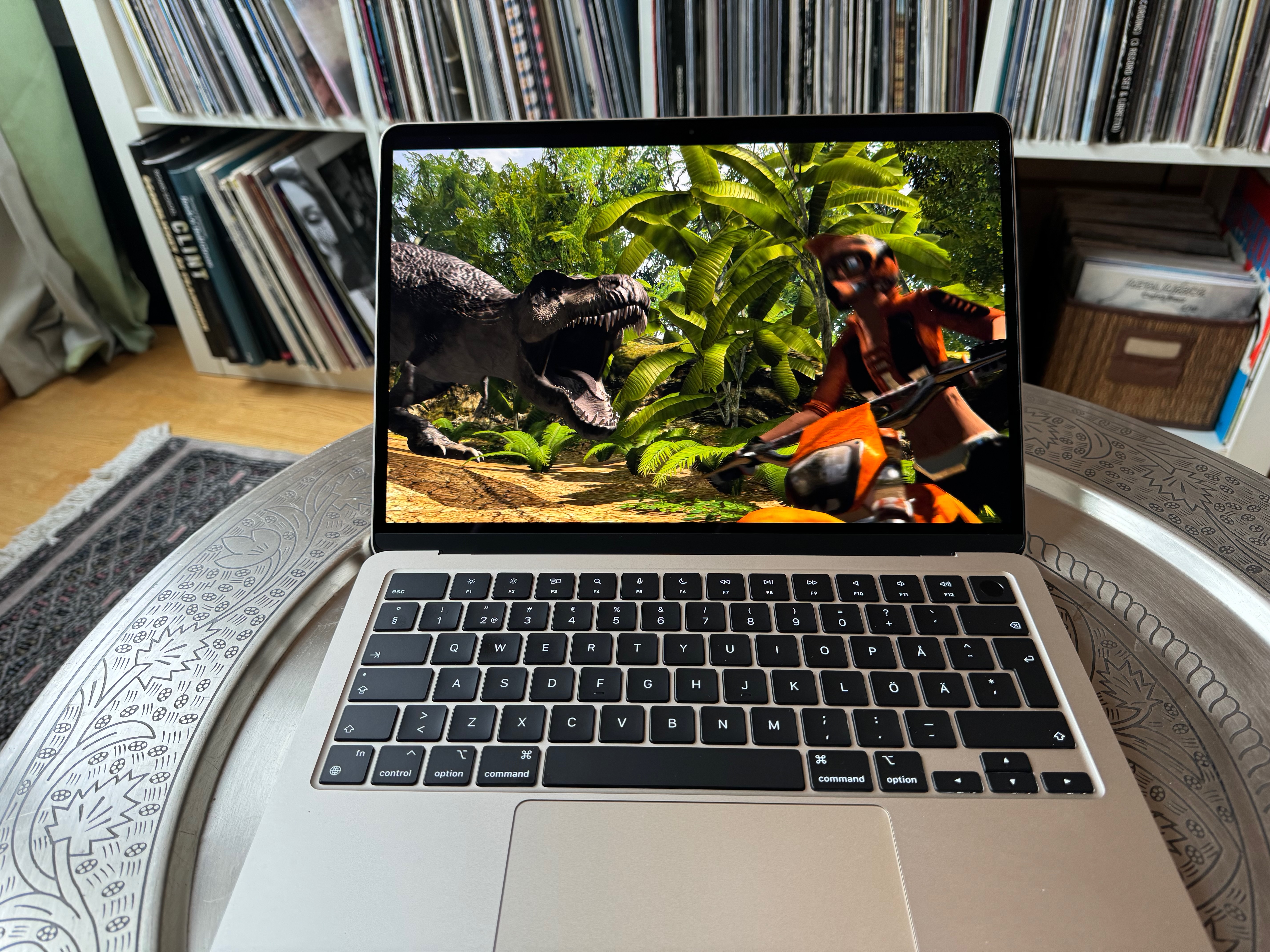
Price When Reviewed:
$1,099
The M3 version of the MacBook Air was introduced in March 2024. In October 2024 Apple increased the standard amount of Unified Memory (RAM) to 16GB without increasing the cost. It’s great news that Apple has increased the RAM without increasing the price as we did feel that 8GB was insufficient. It’s a great Mac laptop, the only reason not to buy one right now is that Apple will probably be updating it in spring 2025. Read: M4 MacBook Air: Everything you need to know.
3. Apple 15-Inch MacBook Air (M3, 2024)
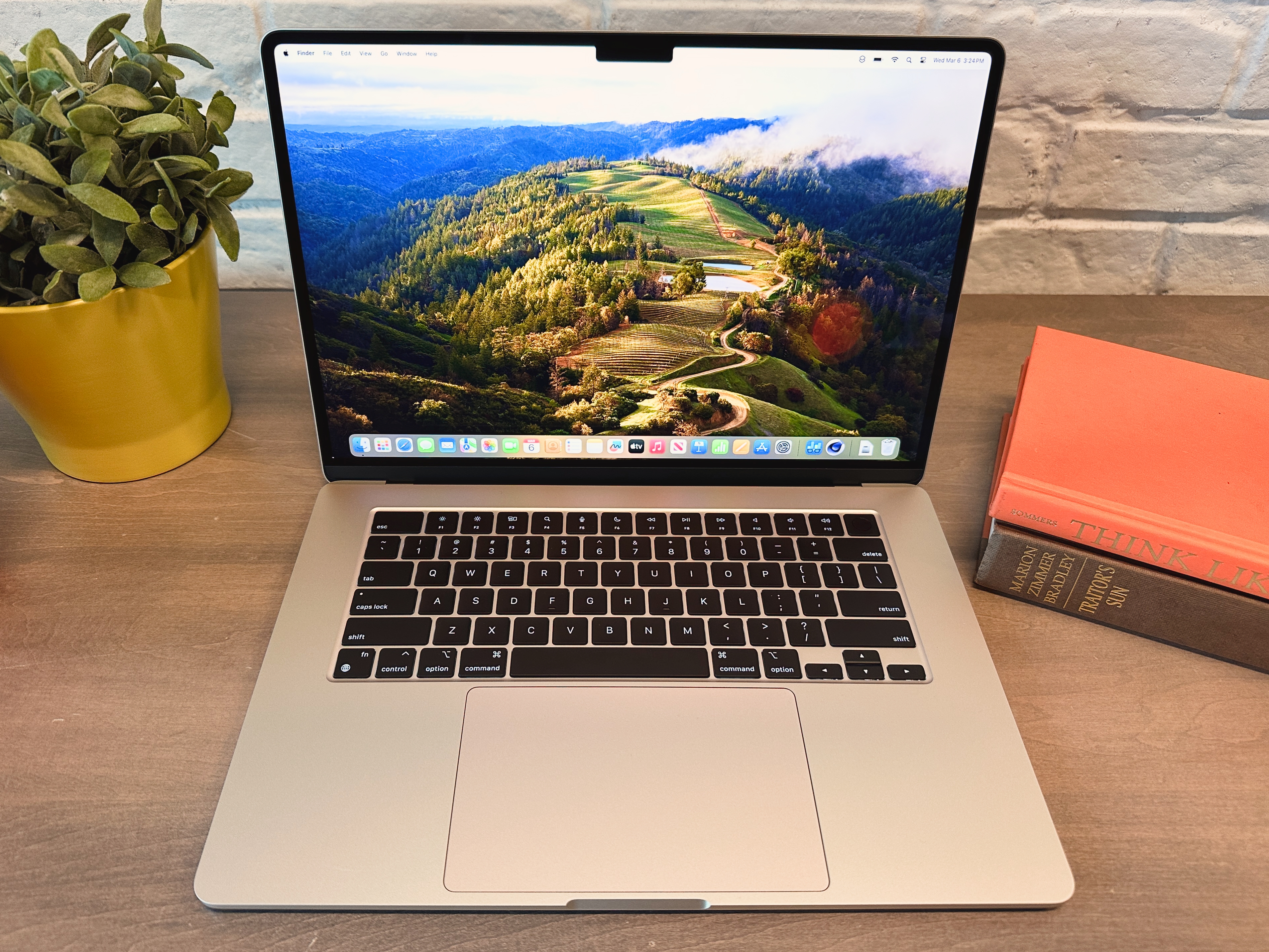
Price When Reviewed:
$1,299
The 15-inch M3 MacBook Air was introduced in March 2024. There is no longer a 15-inch version of the M2 MacBook Air, so if you want the larger display this is the one to buy. In October 2024 Apple increased the standard amount of Unified Memory (RAM) to 16GB without increasing the cost. As with the 13-inch MacBook Air, the only reason not to buy one is that Apple may be updating it soon, but if you can’t wait we don’t think you will be disappointed.
4. Apple 14-inch MacBook Pro (M4, 2024)
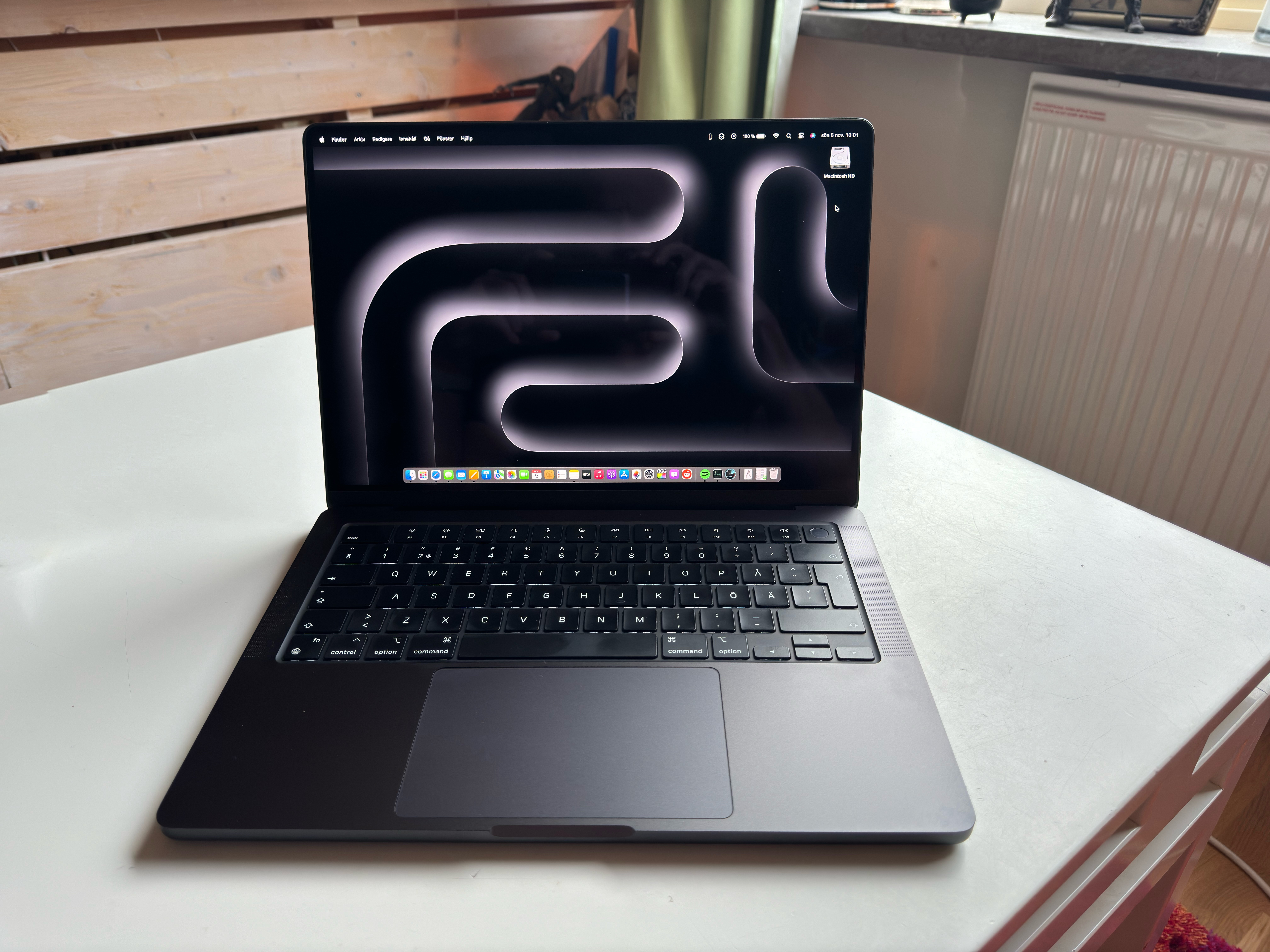
Price When Reviewed:
$1,599 | $1,799 | $1,999
The M4 MacBook Pro arrived in October 2024. It has more powerful siblings in the M4 Pro and M4 Max MacBook Pro, but for those with average requirements, it’s sufficient and better suited to more intensive operations than the MacBook Air. This is a Mac to choose if you need a little more oomph than the MacBook Air can give but don’t have the money for a MacBook Pro with M4 Pro chip.
Read our full
Apple 14-inch MacBook Pro (M4) review
MacBook Air vs MacBook Pro: Design
The design of the MacBook Air hasn’t changed since Apple revealed it in June 2022 and you could have been forgiven for thinking you were looking at a MacBook Pro. Gone is the tapered edge for which the Air was famous, replaced with a more uniform design. The MacBook Air is still thinner–albeit fractionally–but it is also very slightly larger than the old version of the Air, thanks to the bigger screen.
Looking at the screen you will notice the other glaring difference in the new design: the MacBook Air has a notch like the one that’s also seen on the 14- and 16-inch MacBook Pro and iPhones. This enables the bigger screen and conceals a much better FaceTime camera, so it’s not a bad thing, although some people don’t like notches.
If you miss that tapered design that made the MacBook Air instantly identifiable it is still available if you buy the M1 version of the MacBook Air. Apple no longer sells this model as a new laptop, but limited M1 MacBook Air inventory may be available in the Apple Certified Refurbished Store and you may still be able to pick one up from a third party–see our round-up of the Best MacBook Air deals.
If a 13.6-inch screen isn’t big enough for you, Apple added a 15.3-inch MacBook Air to the lineup in June 2023. This larger model looks identical to the 13.6-inch MacBook Air, and shares (mostly) the same specs, it’s just bigger.
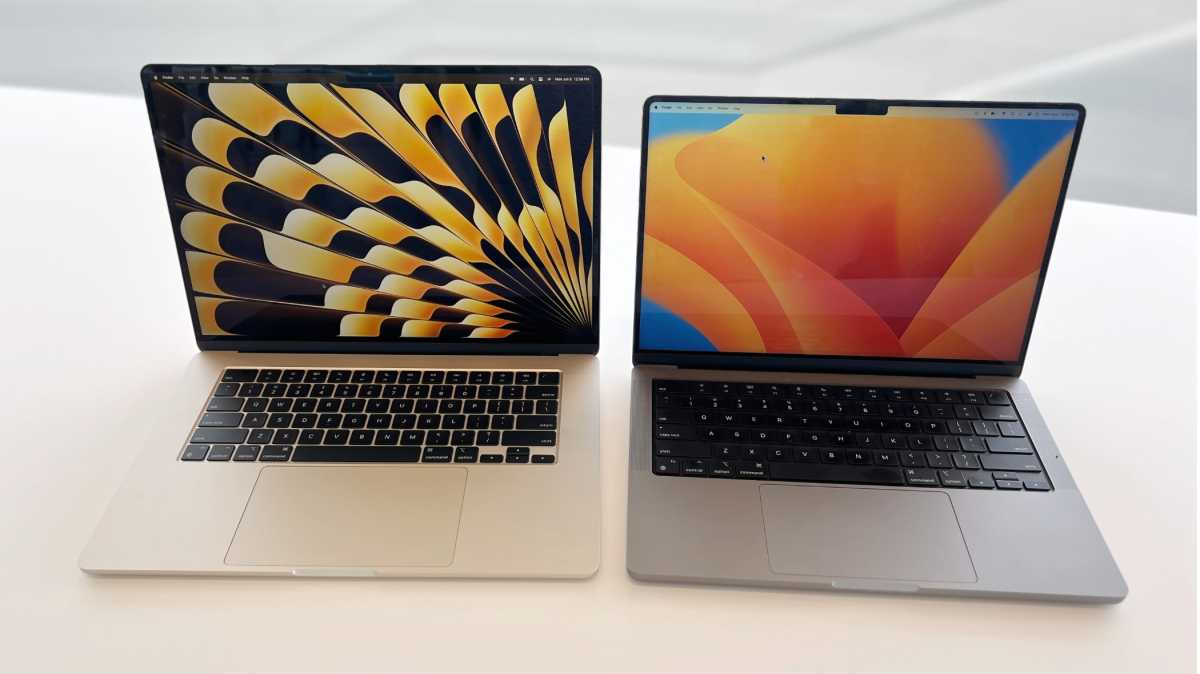
Foundry
The 14-inch MacBook Pro is a bit chunkier and heavier than the 15-inch MacBook Air due to the fans needed for heat dissipation, while the Air is, unsurprisingly, wider and taller, thanks to the bigger display.
Both models have a Touch ID sensor built into the keyboard, and six-speaker arrays (the 13-inch Air only has a four-speaker sound system). The sound on the MacBook Pro is described by Apple as “High Fidelity,” by which we assume Apple is indicating it is superior to the Air. Connectivity for both models is via Bluetooth 5.3 and Wi-Fi 6E.
With the October 2024 MacBook Pro update to the M4 chip, the 14-inch MacBook Pro now has a 12-megapixel camera with support for Center Stage and Desk View. The MacBook Air still has the 1080p FaceTime HD camera. The MacBook Pro camera is much better, in case you’re concerned with quality for video conferences.
Another difference between these MacBooks is the color choices. There are four color choices for the 13-inch MacBook Air and the 15-inch MacBook Air: Midnight (dark blue), Starlight (gold), Space Gray and Silver. The Starlight shade is paler gold, while Midnight is close to black with a dark blue hue. The 14-inch MacBook Pro with M4 offers only Silver and Space Black options.

Apple
MacBook Air vs MacBook Pro: Dimensions
The 13-inch MacBook Air is lighter than the 14-inch MacBook Pro, as you’d expect, but the 15-inch MacBook Air is also lighter than the 14-inch MacBook Pro.
- 14-inch MacBook Pro, M4: 3.4 pounds (1.55 kg)
- 15-inch MacBook Air, M3: 3.3 pounds (1.51 kg)
- 13-inch MacBook Air, M3: 2.7 pounds (1.24 kg)
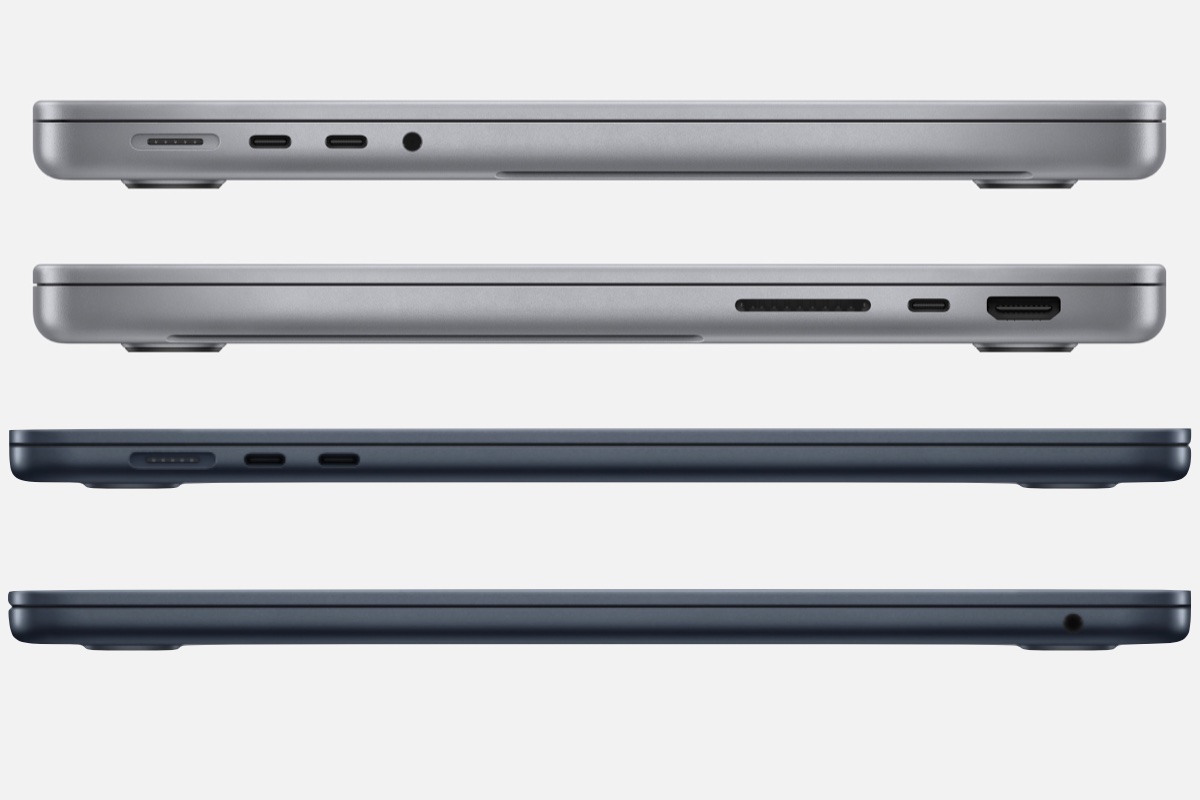
Apple
The 15-inch MacBook Air is the largest of the M3 laptops, but because it’s thinner, it weighs less than the Pro. The 13-inch MacBook Air dimensions aren’t much smaller than those of the 14-inch MacBook Air.
- 15-inch MacBook Air, M3: 13.40 x 9.35 x 0.45 inches (34.04 x 23.76 x 1.15cm)
- 14-inch MacBook Pro, M4: 12.31 x 8.71 x 0.61 inches (31.26cm x 22.12cm x 1.55cm)
- 13-inch MacBook Air, M3: 11.97 x 8.46 x 0.44 inches (30.41 x 21.5 x 1.13cm)
MacBook Air vs MacBook Pro: Display
Here are the specs at a glance:
- 13-inch MacBook Air M3: 13.6 inches diagonal, 2,560 by 1,664 pixels
- 14-inch MacBook Pro M4: 14.2 inches diagonal, 3,024 by 1,964 pixels
- 15-inch MacBook Air M3: 15.3 inches diagonal, 2,880 by 1,864 pixels
The MacBook Air has either a 15.3-inch or a 13.6-inch Liquid Retina display. The MacBook Pro comes with a superior 14.2-inch Liquid Retina XDR panel. The screen on the Air is a bit bigger, but the image quality is not as good as the screen on the MacBook Pro–it still looks great, though.
The 15-inch Air’s display runs at a resolution of 2,880 by 1,864, while the 13-inch offers 2,560 by 1,664. Both Airs have a maximum brightness of 500 nits, which is half of the Pro’s 1,000 nits in normal use, or a third if you’re running HDR content at a max of 1,600 nits. This is achieved by the Pro display incorporating mini-LEDs rather than the Air’s standard LCD screen.
Perhaps the biggest difference though is that the Pro features ProMotion, meaning that the refresh rate tops out at 120Hz, again double that of the Air’s 60Hz refresh rate. This helps keep scrolling and animations smooth and crisp. Any of these displays will be great for everyday use and long hours of work, but the Pro has the edge when it comes to features.
With the M4 MacBook Pro, Apple introduced a nano-texture glass option that has a matte-like finish for $150. This option is not available on the MacBook Air, and if you need to cut down the glare from the display, it’s a feature to consider.
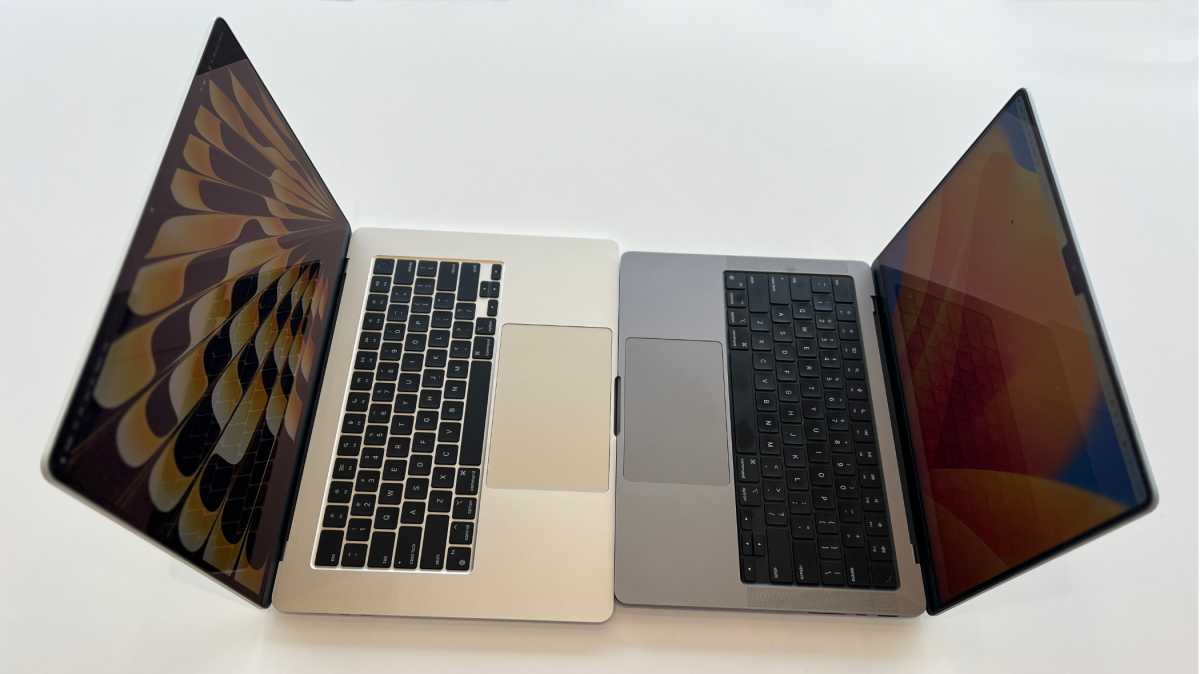
Foundry
MacBook Air vs MacBook Pro: Specs
All of Apple’s laptops are powered by Apple’s silicon. Amidst the MacBook Air and MacBook Pro offerings are two generations of chip: the M2 in the $999 13.6-inch MacBook Air, an M3 in the 13.6-inch and 15-inch Air models, and an M4 in the 14-inch MacBook Pro that we are considering here (there are also M4 Pro and M4 Max MacBook Pro options for those who need more power). To learn more about all the Mac processors read our Mac processor comparison and see how the M3 stacks up against all of Apple’s chips.
In October 2024 Apple upped the standard memory in all the MacBooks – including those introduced previously. This means all MacBook Air and MacBook Pro now have 16GB RAM as standard, most likely because of the requirements of Apple Intelligence, Apple’s AI that comes with macOS Sequoia. Apple didn’t raise prices.
This is how the specs in the various MacBook Air and the 14-inch MacBook Pro standard configurations compare:
| MacBook | Price | CPU | GPU | Memory | SSD |
|---|---|---|---|---|---|
| 13.6-inch MacBook Air, M2 (2022) | $999/£999 | 8-core, M2 | 8-core, M2 | 16GB (up to 24GB) | 256GB SSD |
| 13.6-inch MacBook Air, M3 (2024) | $1,099/£1,099 | 8-core, M3 | 8-core, M3 | 16GB (up to 24GB) | 256GB SSD |
| 13.6-inch MacBook Air, M3 (2024) | $1,299/£1,299 | 8-core, M3 | 10-core, M3 | 16GB (up to 24GB) | 512GB SSD |
| 13.6-inch MacBook Air, M3 (2024) | $1,499/£1,499 | 8-core, M3 | 10-core, M3 | 16GB (up to 24GB) | 512GB SSD |
| 15-inch MacBook Air, M3 (2024) | $1,299/£1,299 | 8-core, M3 | 10-core, M3 | 16GB (up to 24GB) | 256GB SSD |
| 15-inch MacBook Air, M3 (2024) | $1,499/£1,499 | 8-core, M3 | 10-core, M3 | 16GB (up to 24GB) | 512GB SSD |
| 15-inch MacBook Air, M3 (2024) | $1,699/£1,699 | 8-core, M3 | 10-core, M3 | 24GB (up to 24GB) | 512GB SSD |
| 14-inch MacBook Pro, M4 (2024) | $1,599/£1,599 | 10-core, M4 | 10-core, M4 | 16GB (up to 32GB) | 512GB SSD |
| 14-inch MacBook Pro, M4 (2024) | $1,799/£1,799 | 10-core, M4 | 10-core, M4 | 16GB (up to 32GB) | 1TB SSD |
| 14-inch MacBook Pro, M4 (2024) | $1,999/£1,999 | 10-core, M4 | 10-core, M4 | 24GB (up to 32GB) | 1TB SSD |
There are also M4 Pro and M4 Max MacBook Pro models that we discuss in our MacBook Pro comparison and our Best MacBook guide.
If you glance at the specs above, the closest comparison is between the $1,499/£1,499 15-inch MacBook Air and the $1,599/£1,599 14-inch MacBook Pro. The extra money for the MacBook Pro includes a better display, one more Thunderbolt port, an HDMI port, an SDXC Card slot, a better camera, and built-in fans to cool the laptop so it can maintain performance on long tasks. You may or may not need those features.
With a smaller budget the 13.6-inch MacBook Air, M2 (2022) looks like a good deal at $999/£999. The main problem with this machine is the smaller SSD, not just because it’s smaller, but also because the 256GB SSDs are known to be slower. It still might be a good choice despite the SSD, because that probably won’t matter to you if the apps you use aren’t frequently writing to the hard drive.
There are other factors that can slow down the MacBook Air though. Because the Air is compact and fanless it is less able to manage heat, and therefore may run slower in order to keep cool if you really push it. If it’s power you need then the benchmarks give a clearer picture (MacBook Pro M4 benchmarks are not yet available. We will update this chart as soon as we get the data. For your reference, you can see how the rest of the chips compare):
As you can see from the scores above, the M3 shoots ahead of the M2 and M1, in fact it even scores above one configuration of the M1 Pro. But, if you really need a powerful machine you might want to look at the M4 Pro MacBook Pro or shop around for a M3 Pro MacBook Pro which it’s likely will remain on sale for some time even though Apple has discontinued that model. See our round-up of the Best MacBook Pro deals.
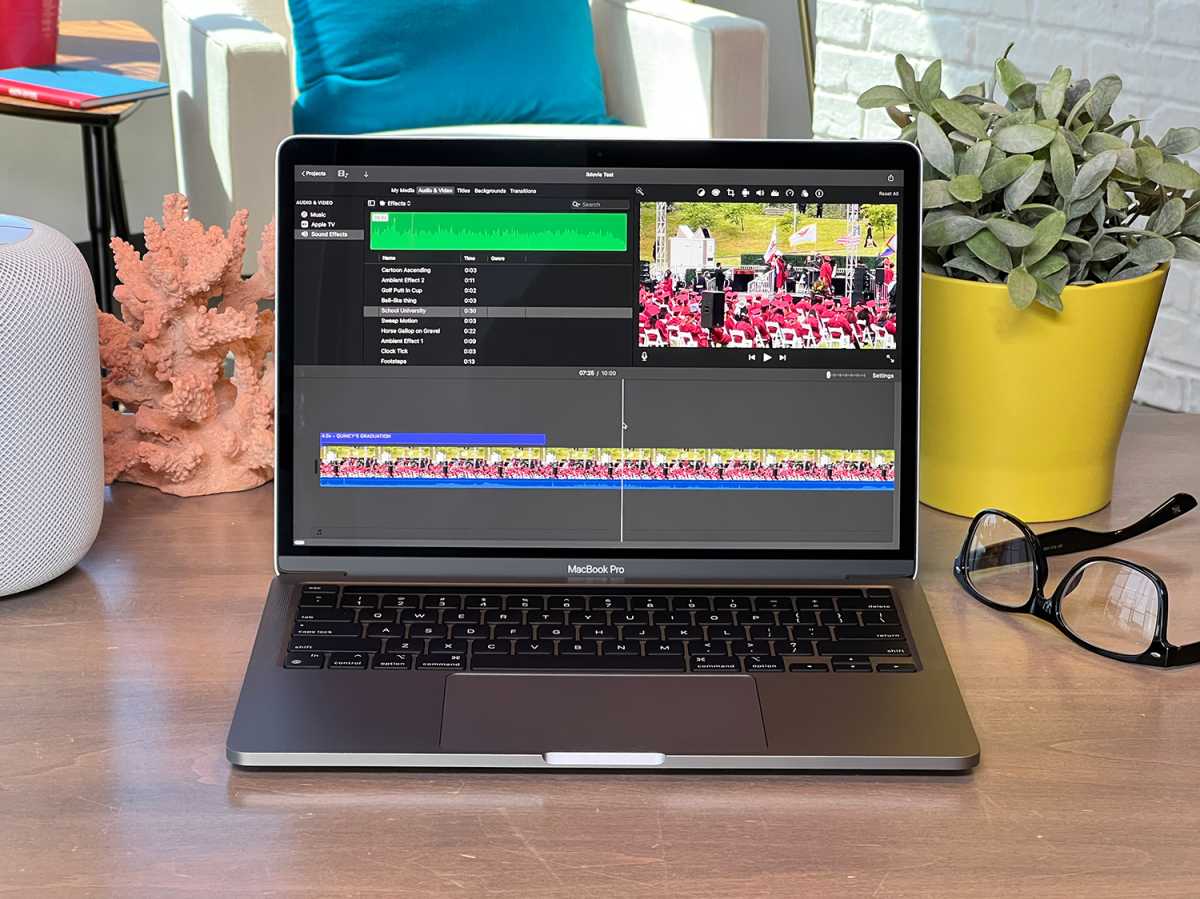
Foundry
RAM
All the MacBooks showcased above now come with 16GB of Unified Memory at their base configuration. The M1 only supported up to 16GB memory, but the M2 and M3 chip bring an option to upgrade to 24GB RAM. The M4 MacBook Pro can support 32GB RAM. If you need more memory than that you need to look to the M4 Pro and M4 Max, which can support 48GB in the case of the M4 Pro and up to 128GB for the M4 Max.
In October 2024, Apple updated the MacBook Air so that it comes standard with 16GB of RAM–it was 8GB before. So, now all Macs start with 16GB of RAM.
Our advice is to get as much RAM as you can afford as you can’t upgrade it later. See: Apple’s MacBook Pro memory problem.
Storage
Apple offers a 256GB storage option at the entry-level for both the 13-inch and 15-inch MacBook Air. The entry-level MacBook Pro starts at 512GB.
There are some concerns about this 256GB SSD, with reports that its SSD is up to 50 percent slower on read speeds and 30 percent on write speeds. We found that these observations were indeed true when we ran our own set of tests using Blackmagic Disk Speed Test. This may matter if you are using apps that access the SSD often, but it may not make a difference in typical use. For this reason, if you can afford a 512GB model we recommend that. You can opt for up to 2TB SSD.
MacBook Air vs MacBook Pro: Battery life and charging
When it comes to battery life these Macs are miles ahead of the old Intel MacBook models. According to Apple, the MacBook Air offers 18 hours battery life, while the 14-inch MacBook Pro offers an amazing 22 hours (the same as the 16-inch MacBook Pro).
In our own testing, the 15-inch M3 MacBook Air battery lasted 19 hours. The battery inside the M3 MacBook Air is the same as that in the M2 models so we didn’t expect any difference in testing.
The battery in the M4 MacBook Pro is bigger than that in the M3 MacBook Pro (72.4-watt hours, up from a 70-watt-hour battery). The M3 model had “Up to 22 hours Apple TV app movie playback” and “Up to 15 hours wireless web” while the M4 model is stated as 24 and 16 hours respectively. The M4 MacBook Pro lasted about 20 hours in our test.
In regular daily use, battery life is just as great. It’s a weird feeling, opening up your laptop and doing work for 20 minutes and seeing that the battery percentage hasn’t changed even a single percent, but that’s how it is with Apple silicon. Obviously, battery life varies based on what you’re doing, but for this laptop’s target market–the everyday home and productivity user–it’s hard to think that you’ll ever have to charge up before the day is done.
It’s not just how long the battery lasts that matters, but also the charging speed. Charging can be fast if you use a good USB-C power adapter. A standard 35W dual-port adapter can achieve a 10 percent charge in 10 minutes (30 percent in 30 minutes). Apple’s 61W USB-C Power Adapter increases this to 72 percent charge in 30 minutes. See our comparison test of Apple’s M2 MacBook Air chargers as well as the best USB-C charger for your MacBook.
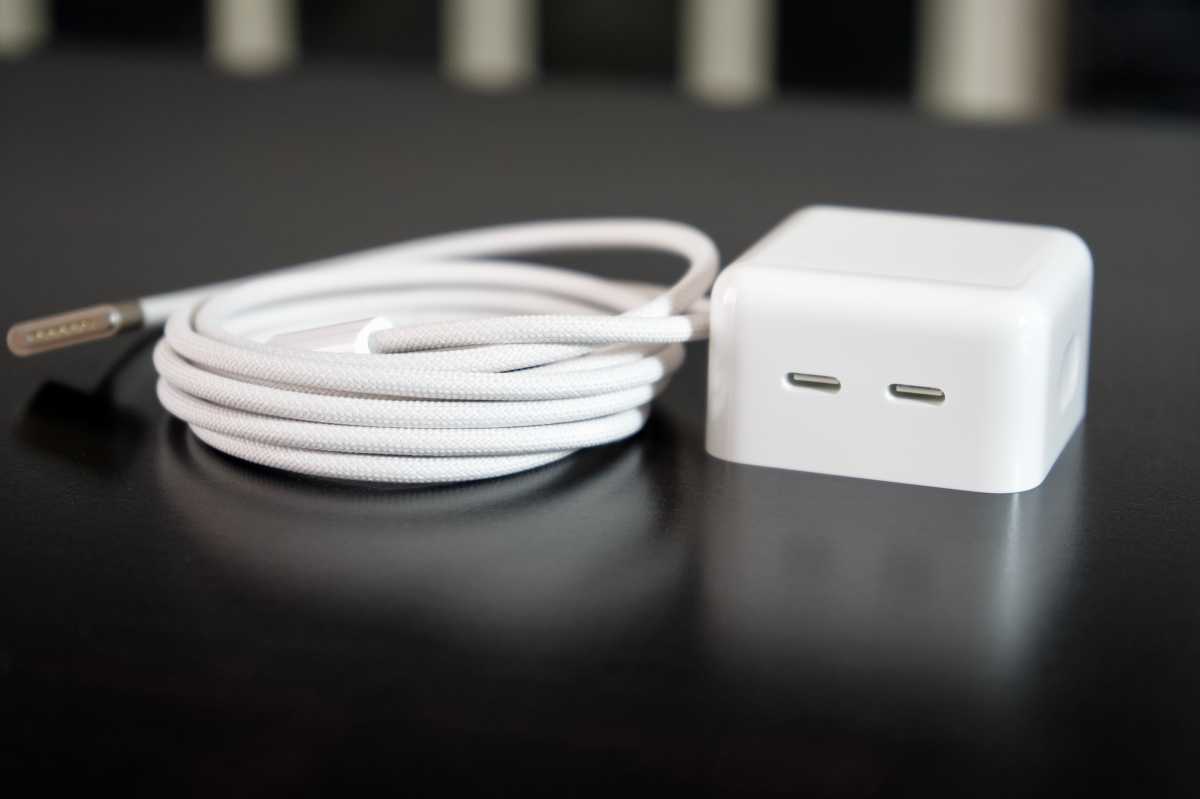
IDG
MacBook Air vs MacBook Pro: Ports and expansion
Over the years it’s felt like Apple has been on a mission to remove ports from Macs in order to make them slimmer and slimmer. This has been a disadvantage for many, although generally if you need more or different ports you can just plug in an adapter or a dock (read: Best USB-C hubs and adapters for Mac).
The older M1 MacBook Air offered only two USB 4 ports two USB/Thunderbolt ports, so one of those had to be used for charging (as was also the case with the 13-inch MacBook Pro). Thankfully, with the arrival of the 2022 MacBook Air, Apple added a MagSafe charging port thereby freeing up the two USB ports so one doesn’t have to be given over to charging (this also applies to the 15-inch model).
The MacBook Pro features even more ports. On the 14-inch M4 MacBook Pro, you get three Thunderbolt/USB 4 ports, a MagSafe charging port, a 3.5mm headphone jack, HDMI, and a SDXC card slot.
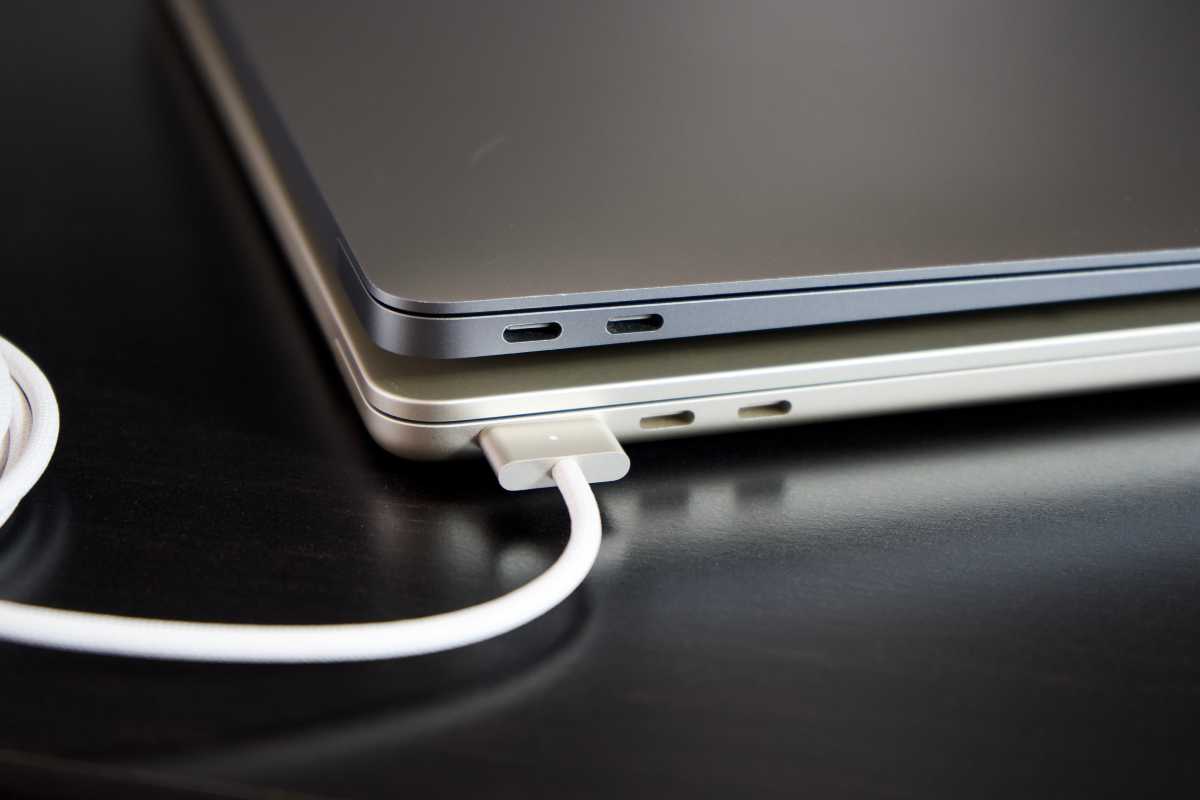
IDG
MacBook Air vs MacBook Pro: Audio and camera
The MacBook Air offers a 1080p FaceTime camera, which is superior to the 720p FaceTime camera on the now-discontinued M1 MacBook Air and 13-inch MacBook Pro.
The 14-inch M4 MacBook Pro has a 12MP Center Stage camera that automatically keeps the user in the center of the frame. The camera also supports Desk View, which can show the desk space in front of the laptop. This is an upgrade from the M3 MacBook Pro, which had the same 1080p FaceTime camera as the MacBook Air.
The 15-inch MacBook Air has a benefit over the 13.6-inch MacBook Air model: if features a six-speaker sound system with force-canceling woofers, compared to a four-speaker sound system. Apple describes the speaker system in the 14-inch MacBook Pro as a high-fidelity six-speaker sound system with force-cancelling woofers, indicating that it is superior to that in the 15-inch Air. Apple also refers to a “studio-quality three-mic array with high signal-to-noise ratio and directional beamforming” in the 14-inch Pro, while both Air models offer only a “three-mic array with directional beamforming”.
All Mac laptops offer a 3.5mm headphone jack.
MacBook Air vs MacBook Pro: Price and buying advice
When Apple introduced the M3 version of the 14-inch MacBook Pro in October 2023 it replaced a much cheaper 13-inch MacBook Pro with M2 chip that started at $1,299/£1,349. Now, the entry-level M4 14-inch MacBook Pro costs $1,599/£1,599 for a 10-core CPU, 10-core GPU, 512GB SSD entry-level laptop. That’s quite a leap from $1,299/£1,299 for the 8-core CPU, 10-core GPU MacBook Air with 512GB SSD.
With no ‘budget’ MacBook Pro available, the MacBook Air is the only option for those looking for a bargain. If you are looking for the cheapest option the $999/£999 M2 MacBook Air would appear to be the clear winner. But the starting price of the MacBook Air M3 is only $100/£100 more. Our advice is to spend the extra money if you can afford to or look for a deal that reduces the M3 MacBook Air to a price you can afford.
The price of the MacBook Pro is higher, and on everyday tasks it performs the same as the MacBook Air, but it does offer better performance on long, CPU-intensive tasks, like image and video rendering and similar tasks. (Not to mention the better screen, HDMI port, and SDXC Card slot.) At just $100/£100 more than the 15-inch MacBook Air with M3 and the same 512GB SSD, it actually represents good value for money.
We recommend getting the best machine you can afford at the time of purchase because you won’t be able to upgrade down the line, this may require you to upgrade the RAM and storage before you make your purchase.
The other factor that may be important to you is the screen size, which is where the MacBook Air is the clear winner, but if you are going to plug your Mac into an external display whenever you are at your desk this shouldn’t be a decision breaker. See our round-up of the best displays for Mac, also bear in mind that it can be complicated using more than one external display with some MacBooks.
So which MacBook should you choose? If you are on a budget it has to be the MacBook Air and you won’t be disappointed, especially now that Apple has upped the memory to 16GB as standard (do make sure you aren’t buying an older version with 8GB memory). If you need a bit more power than the Air can offer the M4 MacBook Pro will see you good. But if you need even more power you’ll have to fork out for the M4 Pro or M4 Max MacBook Pro models.
Luckily, you don’t have to pay full price for a MacBook Air or MacBook Pro, check out our best MacBook Air deals and best MacBook Pro deals articles for the best discounts available.
Finally, a word of warning: if you see a lower price on an Intel MacBook we strongly recommend that you don’t buy it as Apple is unlikely to support Intel Macs for much longer. Read: How long does Apple support Macs.
We also look at how the MacBook Air compares to the iMac and how the MacBook Air and Mac mini compare separately. We also help you choose the Best Mac in our buying guide.





